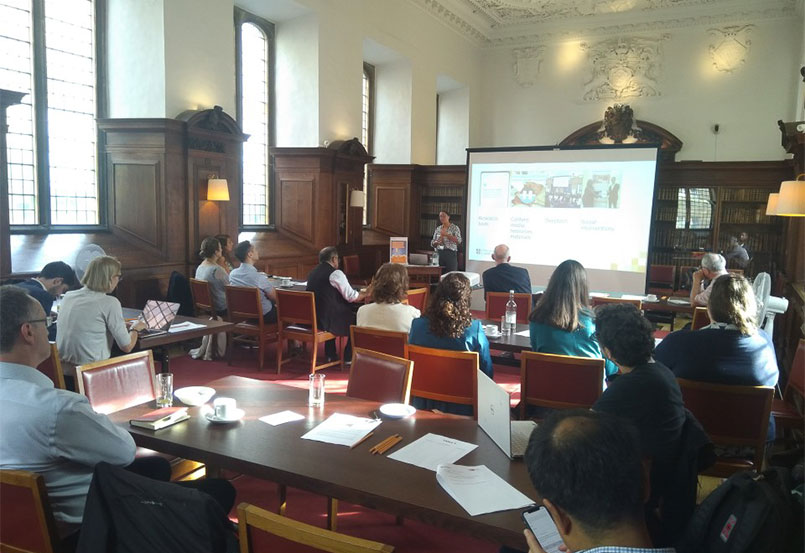Social sciences research: challenges and opportunities
Arts, Humanities & Social SciencesI was delighted to join Cambridge Enterprise as a Project Associate in the Arts, Humanities and Social Sciences last June to work on the CRoSS project (Commercialisation of Research out of the Social Sciences) funded by the ESRC Impact Accelerator Account (IAA). The project aims to build social science researchers’ capacity to identify opportunities for commercialisation.
One of my first tasks was to organise an event for heads of department and senior academics at the University of Cambridge. It was hosted last month in the Old Library at Pembroke College, Cambridge, and we enjoyed the active participation of 21 senior members from departments and offices across the University.
The first part of the event included messages and presentations that set the context in which Cambridge Enterprise operates and how the IAA-founded CRoSS project is delivered. The second part consisted of a semi-facilitated small group discussions. We asked participants if they could reflect on what they see are the challenges and opportunities for commercialising research from the social sciences. Below are some thoughts that emerged from the various conversations.
The first part of the event included messages and presentations that set the context in which Cambridge Enterprise operates and how the IAA-founded CRoSS project is delivered. The second part consisted of a semi-facilitated small group discussions. We asked participants if they could reflect on what they see are the challenges and opportunities for commercialising research from the social sciences. Below are some thoughts that emerged from the various conversations.

Challenges
The push for commercialising research in the social sciences is relatively new compared to STEM subjects. Consequently, commercialisation is not something the academic community in the social sciences may perceive as viable or even appropriate for their disciplines. At the same time, academics and researchers in this space do not necessarily see themselves as entrepreneurs and do not recognise their role as ‘entrepreneurial’.
The discussion highlighted a general perception that words such as ‘products’, ‘markets’, ‘innovation’, and ‘commercialisation’ do not often match social science researchers’ language when they think about their research projects. This lack of familiarity adds to the perception around commercialisation that it is about seeking profit through company creation, and this is not perceived as ‘real’ impact. More importantly, commercialisation may not be considered ‘true’ to independent and critical research – both core values in the social sciences.
The above seems sufficient to put off the commercialisation path those that more strongly aspire to an academic career and for the commercialisation of research to be looked down upon within departments and schools. Of course, those are legitimate perspectives, but we questioned whether commercialisation should be merely seen as a profit-driven endeavour and whether attitudes could be changed.
Opportunities
One aspect that emerged strongly from the discussions is that commercialisation as a concept needs reframing and redescription. The community would benefit from a common language developed around the commercialisation of research, linking the concepts of impact and commercialisation more coherently.
There is also a need to establish a flow of information that keeps researchers informed about what research offices and organisations like Cambridge Enterprise have to offer in terms of support. One challenge that emerged is about communications and how we can communicate opportunities more effectively to departments. Communications may not be sufficiently targeted (personal aspirations and time constraints might be other issues at play and will be explained further below).
However, bridging the dichotomy between impact and commercialisation and communicating opportunities more effectively are two sides of the same coin. One way to engage effectively with the community would be to tailor examples of innovations – and successful commercialisation of innovations – to speak at the sub-level (departmental and/or discipline levels), focusing on societal benefits and societal impact.
Workshops or awareness events could be organised to showcase successfully commercialised innovations in specific disciplines. In Law, for example, many examples would generate vigorous debates among law researchers, practitioners, and scholars. Still, others would ‘breakthrough’ and generate sufficient curiosity about the societal impact derived from commercialisation.
Market-based solutions to address societal problems from academic research should not be presented as a new agenda. Instead, commercialisation should be seen as another possibility within the impact agenda. One of the comments put forward by participants is that in a rapidly changing world, new business models could provide the right incentives for fundamental discoveries, new theories and methods, and the use of data along with those new methodological and theoretical breakthroughs. The market should not necessarily drive research, but commercialisation could be encouraged if it offers the right incentive to address compelling societal problems.
Participants in the workshop saw two opportunities related to these aspects. One is the entrepreneurial mindset that many academics have. It might not be linked directly to commercialisation but submitting research bids and having the ambition of creating one’s team or creating a research centre (to be at the research frontier in one’s field) is, in fact, a strong indication of an entrepreneurial mindset. The other opportunity is that these engagements can lead to access to new funding streams, potentially supporting long-term research projects. Moreover, if well devised and successful, they can generate alternative or complementary career paths for the academic and the younger research team members.
Solutions
From the positions above, challenges and opportunities translated to more well-defined domains. On one side, the skills needed to sustain an entrepreneurial mindset and, on the other, what research offices and institutions like Cambridge Enterprise can do to support the commercialisation journey. In fact, knowledge and expertise to understand if, how and when to commercialise seemed central to participants. Challenges are presented below and matched with opportunities and possible solutions.
Lack of role models and expertise at the peer or department levels. Researchers are experts in their subject area but may lack basic business skills. Beyond business skills, mentorship seem to be something that would be highly beneficial.
Lack of adequate advice on data ownership, relevant IP policies and pathways for commercialisation (licencing, consultancies, etc.) for social scientists. Cambridge Enterprise is already bridging this gap by offering awareness sessions but could also develop a more appropriate approach around IP concepts and protection for arts, humanities, and social science researchers/disciplines.
Time constraints seem more problematic for social scientists than colleagues in STEM subjects. Scientists have more flexibility to be successful researchers and to think about entrepreneurial opportunities (mentorship and peer support mechanisms are also more established in STEM). Contrary, teaching and academic publications are the priority in social science departments.
Even if policy-relevant research is one of the main gateways for impact (and for commercialisation) for social science researchers, policy research is often of secondary consideration within departments, creating a disincentive.
Many impact case studies are not presented to the REF but are still extremely valuable and potentially of commercial relevance. However, researchers may not be thinking about commercialisation as a route. Early review of grant proposals could help consider impact and commercialisation prospects early and may incentivise researchers to consider translational funding opportunities.
Academics who prioritise impact (mainly postdocs or ECR – early career researchers) may not be those invited to key outreach and training events. However, reaching out to academics at different stages in their careers (and early in their research projects) could generate interest and help more proactively fill gaps in commercialisation expertise.
Participants noted the importance of reaching out to ECR. Supervisors and PIs need to be persuaded that students can be seconded to industry and think more systematically about collaborations. Private sector partnerships are not always well received, but partnerships can give exposure to students and researchers. It emerged that it would be relevant to define partnerships in terms of impact and commercialisation.
The University of Cambridge offers a unique environment for nurturing ideas and collaborations within colleges. College lecturers and Junior Research Fellows who may have no formal faculty affiliation and physically locate themselves in college communities can feel isolated from faculty-led initiatives. They are hard to reach but may have the time and desire to think entrepreneurially.
University bureaucracy is perceived as not yet fit for innovation and entrepreneurial approaches. Participants noted complex rules around funding pots and a focus on research grants that preclude access to ‘unconventional’ funding streams (eg. tenders).
About CRoSS
Cambridge Enterprise is organising a series of events to present Cambridge’s response to UKRI Economic and Social Research Council’s new CRoSS programme. CRoSS explores how commercialisation can promote and scale the impact of social science research for wider societal benefit. We conceptualise the commercialisation of research out of the social sciences as market-based solutions to channel academic expertise in solving real-world problems and addressing societal challenges. Market-based solutions comprise many arrangements, including licensing innovative ideas and tools, consulting or creating new companies (including social ventures), and bringing about entrepreneurial pathways to impact.
Tags: commercialisation, CRoSS, social sciences










